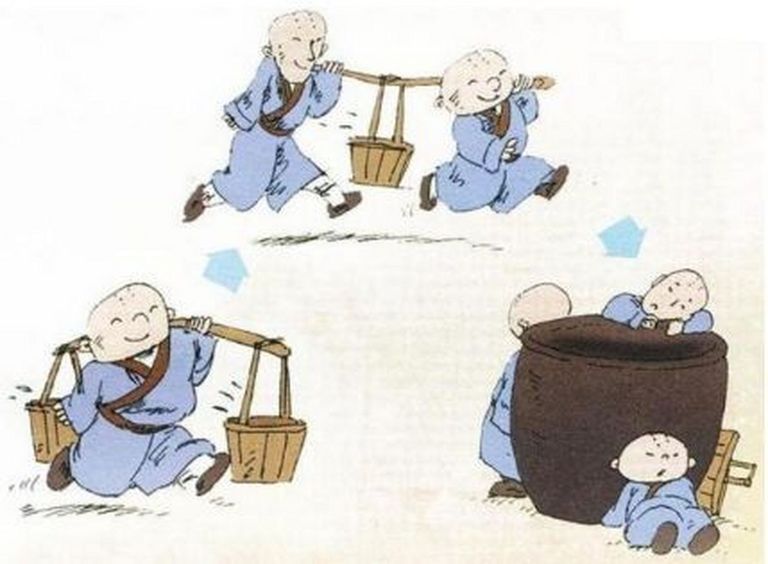
“One monk carries water with a carrying pole to drink, two monks carry water together to drink, and three monks have no water to drink. ” This proverb best expresses human nature.
There was a little monk living in a temple on the mountaintop, and everything in the temple was taken care of by the little monk alone. Every day, the little monk went to a place with a mountain spring a few miles away to fetch water to drink. A person carrying two buckets of water, the mountain road was rugged, and the little monk came and went in a hurry without taking a break because there were other things to do in the temple. One person paid, one person benefited, the little monk was carefree.
One day, another monk arrived and the two monks began to take care of the temple together. Drinking water had become a matter for two people, why should I carry the water alone? The two monks discussed going together to fetch water to drink, although the efficiency was only 25% of the original, after all, neither of them had any objections and reached an agreement. Two monks went to fetch water, but they didn't rush back and forth like before. They might have to rest a few times on the way. In short, everyone was not trying their best. Because two people contributed and two people benefited, there was sometimes no clear and fair standard for how much they contributed and benefited.
After a while, another monk came and it needed three monks to take care of the temple together. Everyone didn't want to go a few miles away to fetch water and drink, they all wanted to sit back and enjoyed the benefits, and no one had put forward reasonable suggestions. Even if someone proposed it, it might not be agreed and implemented, and in the end, everyone could only sit idly in the temple.
What was the final result? Some one left, or some one could not resist the hunger, so he had to go alone to fetch water and enjoyed it himself without sharing the water with others.
Laozi said, “The Tao gives birth to one, one gives birth to two, two gives birth to three, and three gives birth to all things.” Three is a magical number that can transform into infinity and eternity. Give an example:
A working group dispatched by a unit to another city is usually composed of three people. Why is that? Because a person often acts arbitrarily and loses control in the absence of supervision. Two people can easily form an alliance, maintain consistency externally, and are even more difficult to manage. However, it is difficult for three people to form an alliance and reach a consensus, and ultimately each person has their own thoughts and constraints, which makes it less likely for problems to arise. Perhaps this is the stability of a triangle.
To solve the problem of “Three monks have no water to drink”, the following should be done:
1.There should have a common goal. Let everyone know that only through joint efforts can they achieve their goals and the predetermined benefits.
2.There should be clear division of labor. Reasonable division of labor should be based on each individual's specific situation, and there should be no "slackers".
3.There should be a strict system of rewards and punishments. Only strict rewards and punishments can ensure the smooth operation and efficiency of work.
It can be seen that a good management system is actually an insight into human nature.
“一个和尚挑水喝,两个和尚抬水喝,三个和尚没水喝。”这句俗语最能道尽人性。
山顶的一座庙里住着一个小和尚,庙里的一切事物都由小和尚一个人打理。每一天,小和尚要到几里外的有山泉的地方去挑水喝。一个人担着两桶水,山路崎岖,小和尚来去匆匆,也顾不上歇息,因为庙里还有其他的事情要做。一个人付出,一个人受益,小和尚无忧无虑。
有一天,又来了一个和尚,两个和尚便开始共同打理这座寺庙。喝水便成了两个人的事情,凭什么让我一个人挑水?两个和尚便商议共同去抬水喝,尽管效率只有原来的25%,可毕竟两人都没有意见,达成了一致。两个和尚去抬水,也不像以前那样来去匆匆,说不定还要在路上歇息上几次。总之,每个人都不那么尽力了。因为两个人付出,两个人受益,付出和受益的多少有时没有一个明确而公正的标准。
过了一段时间,又来了一个和尚,变成了三个和尚共同来打理这座寺庙。每个人都不想去几里外的地方打水喝,都想坐享其成,也没有人提出合理化的建议来,恐怕即使有人提出来,也未必得到同意和实施,最终只好都在庙里闲坐着。
最后的结果呢?有的和尚离开,或者有的和尚实在忍耐不住饥渴,只好一人独自去打水,回来自己享用,而不会分享给其他的人。
老子说,道生一,一生二,二生三,三生万物。三是个很神奇的数字,数字三能够变化出无限和永恒。举一个例子:
一个单位派驻外地的工作小组,通常是三个人组成,为什么呢?因为一个人在缺乏监管的情况常常会独断专行、为所欲为而失去控制。两个人容易形成同盟,对外保持一致,更不易管理。而三个人就很难形成同盟、达成一致,最终各怀心思,互相制约,反而不容易出问题。这也许就是三角形的稳定性吧。
如想破解“三个和尚没水喝”的问题,必须:
一、要有共同的目标。要让每个人知晓,只有共同努力,才能达到目标,才能实现预定的收益。
二、要有明确的分工。要根据每个人的具体情况,进行合理的分工,既不能出现“滥竽充数”的人,也不能让干活者寒心。
三、要有严格的奖惩制度。只有严厉的奖惩,才能保证工作的运转和效率的实现。
由此可见,良好的管理制度实则是对人性的洞悉。
